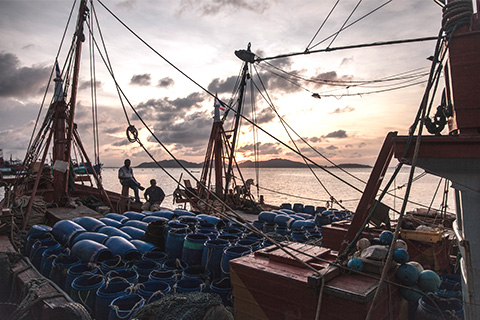
Here at Humanity United, we’ve spent the last several years focusing on the egregious labor abuses that exist in Thailand’s seafood industry. We’ve supported efforts to document and report on the problem, as well as new tools and solutions; we’ve advocated for governmental action, and engaged with corporations who source seafood from Thailand. In part thanks to the work of our partners – dedicated NGOs and investigative reporters who have documented the many faces of this problem – Thailand has spent two consecutive years on Tier 3 of the U.S. State Department’s Trafficking In Persons (TIP) Report, the lowest designation. Additionally, since 2015 Thailand’s fishing sector has been cited by the European Union and has faced the threat of a boycott from European markets.
With this intense level of scrutiny and pressure, we’ve seen the Thai government make promises and begin to establish new systems to address labor exploitation and illegal practices in the fishing sector. The government should absolutely be commended for acknowledging the problem of labor trafficking far more robustly over the past year, and for beginning to take action.
Unfortunately, we’ve also continued to see a fundamental absence of effective government protections and accountability. Recent field research, supported by Humanity United and the Freedom Fund, has indicated the new practices are neither sufficiently established nor enforced to truly protect workers in the fishing industry. With no translators present to interview workers, captains become the only spokesperson for their potentially captive workers; insufficiently trained and incentivized inspection officials look for fishing licenses rather than worker contracts, and have therefore, unsurprisingly, failed to identify any victims of trafficking across their thousands of inspections. Moreover, the migrant labor market continues to be inadequately regulated, meaning that structural vulnerability is built in for the workers streaming across Thailand’s borders looking for new opportunity. These workers are dependent on brokers and the fees they charge, whether entering legally or illegally. They are also prevented from organizing in order to collectively protect themselves from workplace abuses.
What’s more, we have not seen evidence that the Thai government has sufficient political will to fully implement the changes it has begun, if international pressure and accountability is removed.
Next week, the TIP office is scheduled to release the 2016 report. At HU, we have long recognized the importance of the TIP Report to drive awareness and action on behalf of all governments. That is why we have worked closely with government officials and a wide range of partners over the last decade to ensure the report’s integrity, so fundamental to its power to improve the lives of those denied their freedom and dignity.
As the State Department prepares to release its report, we don’t believe Thailand’s limited progress to-date merits an upgrade from Tier 3. Thailand’s government can and should do much more to ensure its actions match its rhetoric, by actually protecting workers from abuse and exploitation in this much-scrutinized industry and beyond.